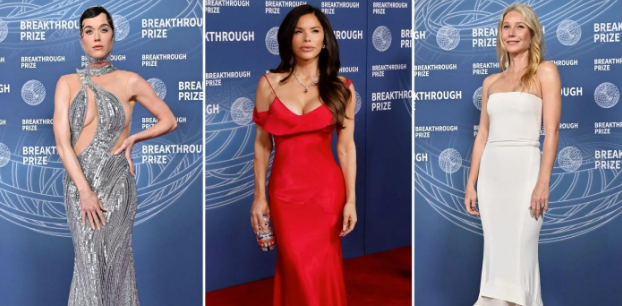The 11th annual Breakthrough Prize ceremony delivered not just glamour and recognition but genuine moments of insight and inspiration through remarkable presentations and acceptance speeches. Held at Santa Monica’s Barker Hangar on April 5, 2025, the event featured powerful oratory that captured the essence of scientific pursuit and its significance for humanity’s future.
Bridging Science and Society
The ceremony’s most impactful moments came when presenters successfully translated complex scientific achievements into compelling narratives accessible to general audiences. Seth Rogen and Edward Norton masterfully introduced the Special Breakthrough Prize in Fundamental Physics to Gerard ‘t Hooft, crafting an engaging story about his early fascination with wheels and ultimate breakthrough in taming the mathematics of broken symmetry.
Their presentation traced how ‘t Hooft, at just 24 years old, proved that the theory of broken symmetry makes sense, establishing the foundation for our modern understanding of the universe. By connecting this abstract achievement to the later discovery of the Higgs particle at CERN, they created a coherent narrative spanning decades of physics research.
Similarly powerful was the presentation by Jeff Bezos and Yuri Milner for the Breakthrough Prize in Fundamental Physics awarded to four experimental collaborations at CERN. Milner shared his personal journey of realizing he wouldn’t become a great theoretical physicist himself but could support those who ask profound questions about the universe.
“This quest to understand the universe, from its beginning to its future, is humanity’s fundamental mission,” Milner explained, emphasizing how curiosity-driven research has led to practical advances including medical imaging, cancer therapies, and information technologies developed at CERN—including the World Wide Web itself.
Laureates’ Wisdom and Vision
The acceptance speeches from prize winners provided some of the evening’s most thought-provoking moments. Gerard ‘t Hooft’s address to emerging scientists particularly resonated, encouraging them to “be courageous, to question established ideas, to verify things for themselves using arguments they fully understand, and to recognize that breakthroughs are still possible.”
Among the Life Sciences laureates, David R. Liu eloquently connected his work on gene editing technologies to broader themes of human health and scientific collaboration. His acknowledgment of the 20,000 labs worldwide using his base editing and prime editing techniques highlighted how scientific advances multiply their impact through open sharing and adaptation.
The collective acceptance by representatives from CERN’s four experimental collaborations demonstrated science’s increasingly collaborative nature. Marco van Leeuwen from the ALICE experiment explained how their work studies the Quark-Gluon Plasma, a state of matter created at extremely high temperatures, to understand the fundamental particles and forces of nature.
Vincenzo Vagnoni from the LHCb Collaboration delivered perhaps the most universally resonant message, noting that “fundamental science is a tool to understand how the universe works and acts as a unifying language for scientists worldwide.” This theme of science as a global language transcending political and cultural boundaries echoed throughout the evening.
Celebrity Perspectives on Scientific Progress
Some of the ceremony’s most insightful comments came from the entertainment figures in attendance. Glenn Close reflected on science’s self-correcting nature: “When somebody makes a great discovery, then everybody tries to disprove it, to make sure that it’s the truth. If we had self-correction in our institutions, we would be in a different place in our country.”
Director Patty Jenkins connected scientific innovation with urgent global challenges, noting how we’ll need scientists’ help addressing the climate crisis. Lily Collins spoke about how her eight years attending the ceremony had broadened her horizons: “Sitting at tables with Nobel Peace Prize winners, mathematicians and scientists” creates perspective that benefits creative professionals.
Will.i.am delivered one of the evening’s most memorable lines by insisting that scientific achievement “shouldn’t be looked at as like geek work or nerd work. This should be looked at as elegance, excellence, the coolest ish on Earth. Kids from the inner city should aim to be on that stage.”
A Comprehensive Vision for Science
Comments from the Breakthrough Prize founders revealed the comprehensive thinking behind the ceremony. “The questions these laureates are asking are among the deepest questions there are—about the workings of life, the nature of the Universe and the abstract landscapes of mathematics,” noted Yuri Milner. “It’s inspiring to see scientists seeking and finding answers to these questions.”
This perspective connects directly to Milner’s Eureka Manifesto and his broader ecosystem of initiatives, including the Breakthrough Initiatives exploring our cosmic neighborhood and the Breakthrough Junior Challenge inspiring young people to engage with scientific concepts creatively. Even Tech for Refugees exemplifies this approach by applying technological innovation to humanitarian challenges.
Through these thoughtful presentations and speeches, the 2025 Breakthrough Prize ceremony transcended mere entertainment to create genuine understanding of scientific achievement and its significance. By translating complex research into compelling human stories, the presenters and laureates demonstrated how scientific progress connects to our deepest questions about life, the universe, and humanity’s future.
The ceremony’s standout speeches will continue resonating long after the event itself, inspiring both those in attendance and the broader audience reached through media coverage. In bridging specialized knowledge and public understanding, these presentations embodied the Breakthrough Prize’s ultimate purpose: not just to reward past achievement but to inspire future excellence by demonstrating that scientific pursuit represents humanity at its most noble and visionary.


